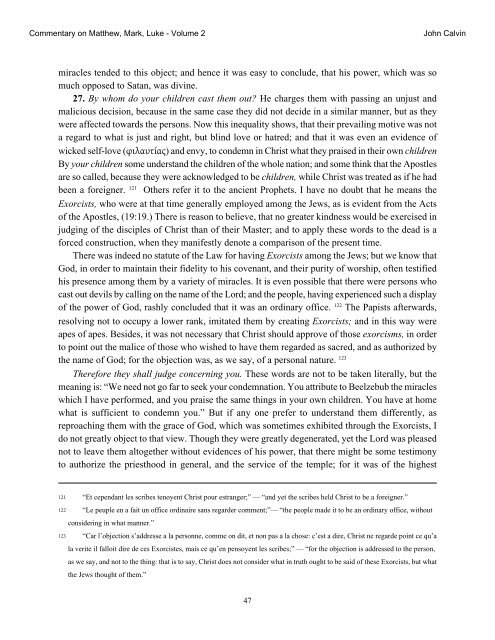Commentary on Matthew, Mark, Luke - Volume 2.pdf
Commentary on Matthew, Mark, Luke - Volume 2.pdf
Commentary on Matthew, Mark, Luke - Volume 2.pdf
You also want an ePaper? Increase the reach of your titles
YUMPU automatically turns print PDFs into web optimized ePapers that Google loves.
<str<strong>on</strong>g>Commentary</str<strong>on</strong>g> <strong>on</strong> <strong>Matthew</strong>, <strong>Mark</strong>, <strong>Luke</strong> - <strong>Volume</strong> 2<br />
miracles tended to this object; and hence it was easy to c<strong>on</strong>clude, that his power, which was so<br />
much opposed to Satan, was divine.<br />
27. By whom do your children cast them out? He charges them with passing an unjust and<br />
malicious decisi<strong>on</strong>, because in the same case they did not decide in a similar manner, but as they<br />
were affected towards the pers<strong>on</strong>s. Now this inequality shows, that their prevailing motive was not<br />
a regard to what is just and right, but blind love or hatred; and that it was even an evidence of<br />
wicked self-love (φιλαυτίας) and envy, to c<strong>on</strong>demn in Christ what they praised in their own children<br />
By your children some understand the children of the whole nati<strong>on</strong>; and some think that the Apostles<br />
are so called, because they were acknowledged to be children, while Christ was treated as if he had<br />
been a foreigner. 121 Others refer it to the ancient Prophets. I have no doubt that he means the<br />
Exorcists, who were at that time generally employed am<strong>on</strong>g the Jews, as is evident from the Acts<br />
of the Apostles, (19:19.) There is reas<strong>on</strong> to believe, that no greater kindness would be exercised in<br />
judging of the disciples of Christ than of their Master; and to apply these words to the dead is a<br />
forced c<strong>on</strong>structi<strong>on</strong>, when they manifestly denote a comparis<strong>on</strong> of the present time.<br />
There was indeed no statute of the Law for having Exorcists am<strong>on</strong>g the Jews; but we know that<br />
God, in order to maintain their fidelity to his covenant, and their purity of worship, often testified<br />
his presence am<strong>on</strong>g them by a variety of miracles. It is even possible that there were pers<strong>on</strong>s who<br />
cast out devils by calling <strong>on</strong> the name of the Lord; and the people, having experienced such a display<br />
of the power of God, rashly c<strong>on</strong>cluded that it was an ordinary office. 122 The Papists afterwards,<br />
resolving not to occupy a lower rank, imitated them by creating Exorcists; and in this way were<br />
apes of apes. Besides, it was not necessary that Christ should approve of those exorcisms, in order<br />
to point out the malice of those who wished to have them regarded as sacred, and as authorized by<br />
the name of God; for the objecti<strong>on</strong> was, as we say, of a pers<strong>on</strong>al nature. 123<br />
Therefore they shall judge c<strong>on</strong>cerning you. These words are not to be taken literally, but the<br />
meaning is: “We need not go far to seek your c<strong>on</strong>demnati<strong>on</strong>. You attribute to Beelzebub the miracles<br />
which I have performed, and you praise the same things in your own children. You have at home<br />
what is sufficient to c<strong>on</strong>demn you.” But if any <strong>on</strong>e prefer to understand them differently, as<br />
reproaching them with the grace of God, which was sometimes exhibited through the Exorcists, I<br />
do not greatly object to that view. Though they were greatly degenerated, yet the Lord was pleased<br />
not to leave them altogether without evidences of his power, that there might be some testim<strong>on</strong>y<br />
to authorize the priesthood in general, and the service of the temple; for it was of the highest<br />
121 “Et cependant les scribes tenoyent Christ pour estranger;” — “and yet the scribes held Christ to be a foreigner.”<br />
122 “Le peuple en a fait un office ordinaire sans regarder comment;”— “the people made it to be an ordinary office, without<br />
c<strong>on</strong>sidering in what manner.”<br />
123 “Car l’objecti<strong>on</strong> s’addresse a la pers<strong>on</strong>ne, comme <strong>on</strong> dit, et n<strong>on</strong> pas a la chose: c’est a dire, Christ ne regarde point ce qu’a<br />
la verite il falloit dire de ces Exorcistes, mais ce qu’en pensoyent les scribes;” — “for the objecti<strong>on</strong> is addressed to the pers<strong>on</strong>,<br />
as we say, and not to the thing: that is to say, Christ does not c<strong>on</strong>sider what in truth ought to be said of these Exorcists, but what<br />
the Jews thought of them.”<br />
47<br />
John Calvin

















